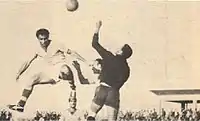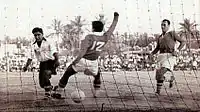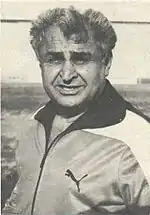Ammo Baba
Emmanuel Baba Dawud better known as Ammo Baba (Arabic: عمو بابا, Syriac: ܥܡܘ ܒܒܐ) (27 November 1934 – 27 May 2009), was an Iraqi football player and coach of the Iraq national football team. He scored the first international goal for Iraq in 1957 against Morocco at the 2nd Pan Arab Games in Beirut and later returned to the team as the coach in 1978.
 | |||
| Personal information | |||
|---|---|---|---|
| Full name | Emmanuel Baba Dawud | ||
| Date of birth | 27 November 1934 | ||
| Place of birth | Baghdad, Iraq | ||
| Date of death | 27 May 2009 (aged 74) | ||
| Place of death | Dohuk, Kurdistan Region, Iraq | ||
| Position(s) | Striker | ||
| Senior career* | |||
| Years | Team | Apps | (Gls) |
| 1951–1954 | RAF Employees' (Assyrian) Club | ||
| 1954–1955 | Al-Haras Al-Malaki | ||
| 1955–1957 | Al-Athori | ||
| 1957–1959 | Al-Quwa Al-Jawiya | ||
| 1959–1962 | Al-Athori (player-manager) | ||
| 1962–1964 | Al-Quwa Al-Jawiya | ||
| 1964–1965 | Maslahat Naqil Al-Rukab | ||
| 1965–1967 | Al-Kuliya Al-Askariya | ||
| 1967–1968 | Maslahat Naqil Al-Rukab (player-manager) | ||
| 1968–1970 | Al-Kuliya Al-Askariya | ||
| National team | |||
| 1953–1967 | Iraq Military | 55 | (21) |
| 1953–1967 | Iraq | 17 | (12) |
| Teams managed | |||
| 1970–1974 | Al-Kuliya Al-Askariya | ||
| 1974–1975 | Al-Jaish | ||
| 1976–1978 | Al-Tamim Province XI | ||
| 1978–1980 | Iraq | ||
| 1980–1981 | Al-Talaba | ||
| 1981–1984 | Iraq | ||
| 1986 | Al-Rasheed | ||
| 1986–1987 | Al-Tijara | ||
| 1987–1988 | Iraq | ||
| 1988–1989 | Iraq | ||
| 1991–1992 | Al-Zawraa | ||
| 1992 | Al-Shorta | ||
| 1992–1993 | Al-Quwa Al-Jawiya | ||
| 1993 | Iraq | ||
| 1993 | Qatar SC | ||
| 1993–1994 | Al-Zawraa | ||
| 1994–1995 | Al-Karkh | ||
| 1995–1996 | Ramadi FC | ||
| 1996 | Iraq | ||
| 1997 | Iraq | ||
| 1997 | Al-Shorta | ||
| 1997–1998 | Al-Zawraa | ||
| 1999–2000 | Salahaddin FC | ||
| 2000 | Iraq U17 | ||
| 2000–2001 | Al-Quwa Al-Jawiya | ||
| 2001–2002 | Al-Shorta | ||
| * Senior club appearances and goals counted for the domestic league only | |||
Playing career
Ammo Baba was born in Baghdad, Iraq, of Assyrian ethnicity. He emerged in the Middle Eastern football scene at the age of 16 at a 1951 Pan Arab School Championship in Cairo playing for the Iraq against the home nation Egypt. He had been discovered by Iraqi schoolboys' coach Ismail Mohammed while playing for the Liwa Al-Dulaim school province team. Mohammed gave him the nickname 'Ammo Baba' and advised him to move to Baghdad to play for one of Iraq's top teams.[1] Ammo who is still revered by generations who never saw him play, was an instinctive out and out goalscorer, known for his bicycle kicks or backward double-kicks as they are known in Iraq, heading ability, and the power of his shooting. He had an opportunist's eye for goal but also displayed magnificent technique and virtuoso skill of a great footballer.
Ammo was born in Baghdad on the British controlled military camp RAF Hinaidi but moved with his family to live on the Civil Cantonment on the large RAF base in Habbaniya in 1937, where he first learnt to play the game of football. After playing for his school team, he moved to RAF Employees' (Assyrian) Club in 1951 replacing legendary striker and fellow Assyrian Aram Karam, where he played with other famous Assyrian footballers such as Hormis Goriel, Emmanuel "Ammo Simsim" Samson and Youra Eshaya. In 1954 he signed for Baghdad-based Al-Haris Al-Maliki where he was a huge success, scoring bundles of goals, season after season. The goalscorer wore the legendary number 8, though that is not the number a forward normally wears, it did not stop him from scoring. The prolific marksman was once the captain of a short-lived Arab national team during the mid-Sixties, in a Nasser-inspired experiment in Arab unity which failed due to the fact that, which Ammo Baba puts it 'no one wanted to play against us'. It had been the initiative of Arab radio station Sawt Al-Arab (Voice of the Arabs) in Cairo, and two of the best players from each Arab country were called up to take part in the team, from Iraq Ammo Baba, and Qais Hamed were selected. The team organised in Egypt did not play in any international competitions, managing only to play a few local teams in Cairo and Alexandria. Ammo Baba had been picked alongside Qais Hamed, and the team was able to beat Al-Ismaili, Al-Ittihad Alexandria, draw with Zamalek and lose to Tersana, with Ammo scoring the first goal for the Arab team, and hit another two goals against Al-Ismaili.
After brilliant scoring record for both Iraq and Al-Quwa Al-Jawiya, he was spotted by English 2nd Division side Notts County managed by former Iraqi military coach Frank Hill and was offered a contract to play for them, but when the call from Meadow Lane came, he could not leave the country, due to a sudden coup led by the Iraqi General Abdul-Karim Qasim on 14 July 1958. A year earlier another former coach of his, William Cook offered him a chance to play for Crewe Alexandra, then in the English Third Division and there were also offers from Chelsea and Celtic but Ammo decided to stay in Iraq.
By the age of 20, becoming one of Iraq's most prolific goalscorers at both local and international level, with a near perfect 100% goal-scoring ratio from 1955 to 1960. As a player, he could adapt to any position, and played in defence, midfield and attack in his playing career.
A national championship winning coach at the age of 23 at Al-Athori, made even more impressive when you think it was done with an Assyrian only club policy, and in 1967, Ammo was coaching two teams in the Iraqi league.[2]
He went on to play and coach Al-Athori (Assyrian Sports Club) to the Iraqi Cup Championship in 1960 beating his former employers Al-Jawiya 3-0 in the final, before returning to Al-Jawiya in 1962 after Al-Athori were relegated from the Iraqi first division. He later played for Al-Maslaha and Al-Kuliya Al-Askariya before calling it a day in 1970.
International goals
Scores and results list Iraq's goal tally first.
| No | Date | Venue | Opponent | Score | Result | Competition |
|---|---|---|---|---|---|---|
| 1. | 19 October 1957 | Beirut | 1–0 | 3–3 | 1957 Pan Arab Games | |
| 2. | 23 October 1957 | 1–0 | 3–1 | |||
| 3. | 15 November 1959 | Beirut | 1–0 | 2–0 | 1960 Olympics qualifiers | |
| 4. | 2–0 | |||||
| 5. | 25 November 1959 | Baghdad | 1–0 | 8–0 | ||
| 6. | 3–0 | |||||
| 7. | 6 December 1959 | Adana | 1–0 | 1–7 | ||
| 8. | 13 December 1959 | Baghdad | 1–1 | 2–3 | ||
| 9. | 2–1 | |||||
| 10. | 4 September 1965 | Cairo International Stadium, Cairo | 1–0 | 6–0 | 1965 Pan Arab Games | |
| 11. | 2–0 | |||||
| 12. | 10 March 1967 | June 11 Stadium, Tripoli | 1–0 | 2–2 | Friendly | |
Coaching career

Due to a serious injury he sustained in 1965 while playing for Iraq at the Pan Arab Games in Cairo, Ammo was nearly forced to retire from the game but returned to play for a further five years. He began his coaching career at Al-Maslaha (Passenger Transport) team in Baghdad in 1967 in a player-coach role. A year earlier while returning from injury, the Iraq FA named him coach of the Baghdad XI side for a match against East Germany however they were beaten 4-0 by the Germans and Ammo was relieved of his duties.
In 1978, Baba was appointed as Iraq's football military national team coach, leading the team to its third CISM World Military Championship title a year later beating nations such as Austria, Morocco, and Greece, on the way to the final where they beat Italy, on penalties.
The same year he was appointed as the head coach of Iraq's national team for the first time. He would be appointed and re-appointed on seven occasions, during the 1980s and 1990s (see below for exact years). Iraqis often call the 1980s as the "golden years" of Iraq football, where Baba led the national team to numerous tournaments and many titles.
Throughout his coaching years, Baba was also the Olympic team head coach, where he led the team to two Olympic appearances in Los Angeles 1984, and Seoul 1988.

In addition, Baba led Iraq to three titles in the Gulf Cup (1979, 1984, 1988), the Asian Games of 1982, and the Arab Nations Cup in 1988.
Baba also found success in the Iraqi League, where he led Al Talaba to a title in 1981. After leaving the national scene, Baba was hired by Al Zawraa, and led them to a title in 1994.
Managerial statistics
| Team | Nat | From | To | Record | ||||
|---|---|---|---|---|---|---|---|---|
| G | W | D | L | Win % | ||||
| Iraq | 1978 | 1979 | 18 | 14 | 2 | 2 | 77.78 | |
| Iraq | 1981 | 1984 | 63 | 34 | 9 | 20 | 53.97 | |
| Iraq | 1987 | 1988 | 40 | 23 | 6 | 11 | 57.50 | |
| Iraq | 1988 | 1989 | 12 | 4 | 4 | 4 | 33.33 | |
| Iraq | 1993 | 1993 | 4 | 1 | 0 | 3 | 25.00 | |
| Iraq | 1996 | 1996 | 2 | 2 | 0 | 0 | 100.00 | |
| Iraq | 1996 | 1996 | 2 | 2 | 0 | 0 | 100.00 | |
| Iraq | 1997 | 1997 | 1 | 1 | 0 | 0 | 100.00 | |
| Total | 142 | 81 | 21 | 40 | 57.04 | |||
Personal life

Ammu Baba was one of the few prominent Iraqis to openly confront Uday Hussein, the president of the Iraqi Football Association, once even refusing to accept a medal from him in front of 50,000 fans after a game in 1992.[3] After the Iraq war all of his family, including his children, moved to Chicago where there is a sizeable Assyrian community, while he stayed in Baghdad, where he ran a football academy for teenagers.[3] On 20 January 2006 the 71-year-old Baba was attacked in his home, where he was tied, blind-folded, beaten, and then robbed.[3]
Ammo Baba died in Dohuk, at the age of 74, on Wednesday 27 May 2009, after suffering from diabetes and its complications in Duhok. He was buried at Baghdad's largest stadium as he requested before his death.[4]
Honours
As a player
- Al-Haris Al-Maliki[5]
- Iraq Central FA League: 1954–55, 1955–56
- Army Cup: 1955, 1956
- Al-Maliki Cup: 1955
- Al-Quwa Al-Jawiya
- Iraq Central FA League: 1957–58, 1961–62, 1963–64
- Iraq Central FA Perseverance Cup: 1962, 1964
- Army Cup: 1959, 1964
- Authority Director Cup: 1964
- Iraq military team
- Arab Military Games: 1965
- Iraq national team
- Tripoli Fair Tournament: 1967
As a manager
- Al-Tamim Province XI
- Republic Championship: 1976
- Iraq national team
- Asian Games: 1982
- Arab Nations Cup: 1988
- Arabian Gulf Cup: 1979, 1984, 1988
- Merdeka Tournament: 1981
- Iraq military team
- World Military Cup: 1979
- Al-Talaba
- Al-Rasheed
- Al-Zawraa
References
- Mubarak, Hassanin. "Ammo Baba: The Amazing Story Of Iraq's Football Legend". Goal.com.
- Mubarak, Hassanin. "Ammo Baba: The King is dead, long live the King". Iraqsport.wordpress.
- "Ammo Baba: Footballer and coach revered by the people of Iraq - Obituaries - News". The Independent. 2009-06-03. Retrieved 2012-08-17.
- "Middle East | Funeral held for Iraq football legend Dawud". BBC News. 2009-05-29. Retrieved 2012-08-17.
- The Football Poet.. Ammo Baba
- BBC video interview
- Assyrian Sports : Hall of Fame : Soccer
- BBC reporting his funeral
- Mubarak, Hassanin. "Ammo Baba ... the football poet" (PDF). Iraqsport. Archived from the original (PDF) on March 19, 2003. Retrieved 2003-03-19.
- Hassanin Mubarak. "Player Database". iraqsport.com. Archived from the original on June 18, 2001.